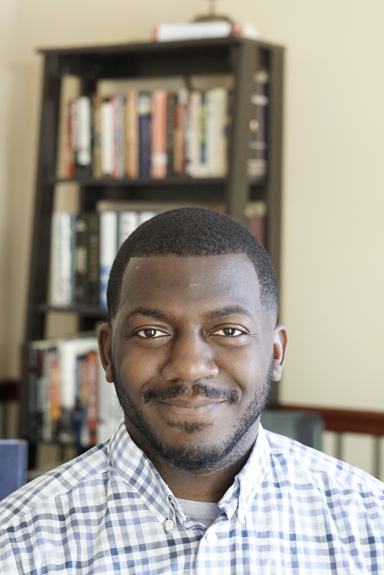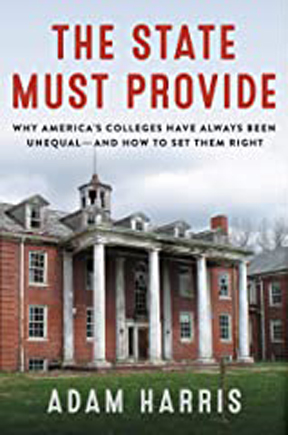Knowing Adam

Diligent Son Defends HBCUs
[EDITOR’S NOTE: The Atlantic writer and AAMU alumnus Adam Harris has received national acclaim in light of his new book, The State Must Provide: Why America’s Colleges Have Always Been Unequal—And How to Set Them Right. Nonetheless, the busy young Normalite took time from a hectic schedule and agreed to answer questions posed by the BottomLine. So, grab your favorite dessert, coffee or tea; find your best easy chair; and let’s all gain a new perspective on knowing the HBCU from Adam]
BOTTOMLINE: Your mom, uncle and sister attended A&M. Are there any other reasons impacting your decision to attend, too?
ADAM: My familial ties were the primary reason, and Alabama A&M offered me a chance at a full-ride academic scholarship which would have been difficult to turn down.
_______
BOTTOMLINE: What was your major and who were your mentors while at A&M?
ADAM: I was a political science major with a philosophy minor, and worked in the old Department of Behavioral Sciences (now Department of Social Sciences) as a student assistant. All of the professors there really cared and nurtured me. Dr. Ronald Slaughter; Ms. Diane Wilkinson, who taught almost all of my philosophy courses; Ms. Stephanie Allen, whose African-American History class was such an important foundation for my future work; Mr. Douglas Turner, who taught my Western Political Thought course, and really knew how to get the best out of his students.
_______
BOTTOMLINE: What were your favorite activities while on The Hill?
ADAM: I was lucky to be involved with several organizations on campus, including the Pre-Law Society, so I always enjoyed those meetings. And, for fun, I always liked stopping by Every Sunny Wednesday on The Quad
_______
BOTTOMLINE: Please give a rundown of ‘just a few’ of your classmates who also are
achieving on a national scale?
ADAM: To name a few: Kevin Ferguson has really been on a tear since A&M with positions at BP and Chevron before attending Harvard Business School and Tsinghua University as a Schwarzman scholar. Kee Tobar is the first race, equity, and inclusion director for Community Legal Services in Philadelphia — the largest legal services group in the city. Ryanna Miller recently won a major grant from the State Department to host the REACH: HBCU Global Institute for more than 400 HBCU students and faculty in Alabama.
_______
BOTTOMLINE: We looked, although in haste, but did not find a mention of your actual birthplace. Where do you call home?
ADAM: We were a military family, so we lived a little bit of everywhere. I was born in San Antonio, Texas, and ultimately ended up graduating from high school just outside of San Antonio at Steele High School in Cibolo. But most summers—and a large chunk of my childhood—were spent in Montgomery (Ala.), where my dad was stationed off and on and where my grandpa lived.)
_______
 BOTTOMLINE: In your extensive reporting on HBCUs and the injustices in their funding,
using one of your analogies [about predominantly white institutions (PWIs) always
being a step or two ahead], where do you envision HBCUs in the scheme of things in
a decade or two?
BOTTOMLINE: In your extensive reporting on HBCUs and the injustices in their funding,
using one of your analogies [about predominantly white institutions (PWIs) always
being a step or two ahead], where do you envision HBCUs in the scheme of things in
a decade or two?
ADAM: HBCUs continue to play a vital role in educating—and lifting up—a student population that has not historically been served well by the majority of higher education and, a decade from now, I think they will continue to play that important role. But I also believe we're at an inflection point where people are beginning to understand the role that state and federal policy has played in keeping HBCUs underfunded—and I hope my book helps play a role in that understanding—so hopefully that urges on a wave of continuing appropriations to the institutions.
_______
BOTTOMLINE: As the number of American Descendants Of Slavery (ADOS) declines to growing percentages of black immigrants from throughout diaspora (along with the overwhelming number of African-Americans who have attended and currently attend PWIs), could the support for HBCUs in the future implode?
ADAM: I do think there are spots where HBCUs should be concerned about future enrollments—especially given that we've seen a contraction in enrollments over the last several years. In Spring 2013, there were more than 19 million students enrolled in institutions of higher education across the country; this past Spring, the National Student Clearinghouse estimated that there were 16.9 million. A lot of that contraction has been at the community college and for-profit college level, but it's important to consider when thinking about the potential difficulty of recruiting a student body in the future. That said, over the last several years, HBCUs in particular have witnessed a renaissance of attention—and if they can receive the resources to match that attention and undertake infrastructure enhancement programs, expand course offerings, and the like, they may be in as good a position as any institution for the future.
- Jerome Saintjones